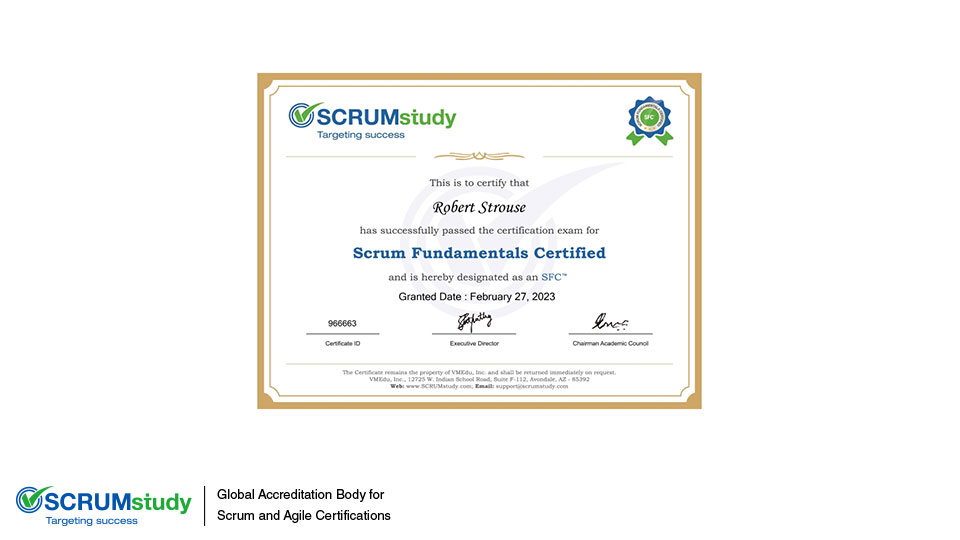Professional Scrum Master certification training registration
Posted by SCRUMstudy® on July 15, 2024
Categories: Agile Certification SBOK® Guide Scrum Scrum Master Scrum Principles Training
Registering for Scrum Master certification training involves selecting a reputable training provider and enrolling in one of their offered courses. This process typically includes filling out an online registration form, selecting preferred dates and training formats (such as in-person, virtual, or self-paced), and completing the payment.
Embark on your journey to become a Scrum Master Certified with our comprehensive training program. The course offers in-depth coverage of Scrum principles, practices, and methodologies, equipping you with the knowledge and skills needed to excel in your role. Led by experienced instructors, our training emphasizes practical application, interactive learning, and real-world scenarios to ensure you're ready to lead Scrum teams effectively. Whether you're new to Scrum or seeking to enhance your skills, our certification training will empower you to drive successful Agile transformations and deliver value to your organization. Register now and take the first step towards unlocking your potential as a certified Scrum Master.
The Scrum certification online exam serves as a comprehensive assessment tool for individuals seeking validation of their Scrum knowledge and expertise. Through this exam, candidates are evaluated on their understanding of key Scrum principles, roles, events, and artifacts. The exam covers essential topics such as Scrum framework, Agile methodologies, Scrum roles (Product Owner, Scrum Master, Development Team), Scrum events (Sprint, Sprint Planning, Daily Standup, Sprint Review, Sprint Retrospective), and Scrum artifacts (Product Backlog, Sprint Backlog, Increment). Successful completion of the exam demonstrates proficiency in Scrum practices and principles, making it a valuable credential for professionals aspiring to excel in Agile project management roles.
We will attempt to do a quick overview of some of the Scrum certifications that are currently being offered.
Next, let's discuss how to choose the right Scrum trainer. While it can be beneficial to find a Scrum trainer with a similar background to yours, it is not an absolute requirement. The framework and style of Scrum training can vary from trainer to trainer, so it's important to find one that matches your learning style.
The biggest positive of a formal Scrum training is that you learn everything in a controlled environment. You meet people who are also there to learn about Scrum and in case you have common background, it helps to understand the process and difficulties of implementation from outsider’s point of view. A formal training also helps you understand about the mistake which you may make due to the traditional project management concepts rooted in you.
The main purpose of any certification is to impart a common baseline of the knowledge. These Scrum certifications, compared to any other project management certifications have a very easy test. You should remember that getting a Scrum certificate is way easier than the implementing actual Scrum framework.
Scrum and Agile methodologies offer significant flexibility in implementation. However, it's crucial to maintain the core principles of the process. Project managers who modify essential elements of Scrum are often referred to as "Scrumbut." It is generally recommended to adopt Scrum in its entirety initially to fully understand its mechanics. Once you have a solid grasp of the framework, you can then make informed decisions about potential adjustments. Over time, you may realize that no changes are necessary.
You need to understand that nothing is more valuable than experience. Scrum or Agile Certification may only add some credibility and marketability to the individual.

